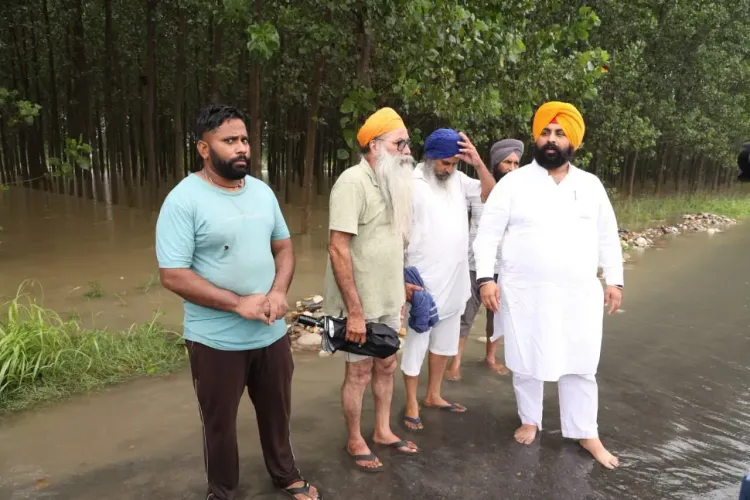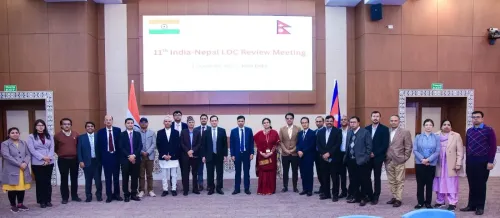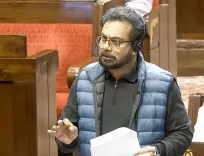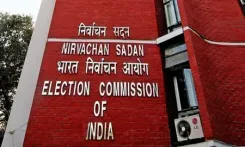Can Floods Drown the 'Chardi Kala' Spirit of Punjabis?

Synopsis
Key Takeaways
- Community resilience shines through in times of adversity.
- 'Chardi Kala' embodies the spirit of hope and positivity.
- Active participation in relief efforts is crucial for recovery.
- Religious and community support play significant roles in coping with disasters.
- Government and NGOs are vital in providing assistance during crises.
Ferozepur/Gurdaspur, Sep 1 (NationPress) "We have encountered more challenging times before, and this too shall pass," stated an elderly villager whose farmland and home have been engulfed by the rising waters of the Sutlej River on Monday.
Octogenarian Gurdial Singh, who endured the shelling during the India-Pakistan conflicts of 1965 and 1971, shared with IANS that the essence of 'Chardi Kala' remains strong and evident in everyone—from the oldest to the youngest—despite the severe floods that have compelled numerous villagers living just a few kilometers from the International Border in Punjab's Ferozepur district to evacuate their residences.
The term 'Chardi Kala' embodies the spirit of maintaining high morale in all circumstances, including during hardships.
With prayers on their lips, his wife Nachattar Kaur expressed, "May Waheguru (God) bless every home with safety, peace, and Chardi Kala."
As Punjab grapples with its most severe flooding in 37 years—affecting millions and leading to the loss of homes, cherished crops, and even lives—Sikh volunteers, primarily from the flood-affected communities, are actively assisting Central and state agencies in rescue and recovery efforts.
Braving the torrential waters, villagers—including women and children—are diligently participating in the construction and upkeep of river embankments by placing soil bags, distributing medical supplies, and providing fodder while navigating boats from village to village across the severely impacted districts.
"We are recognized worldwide for our readiness to aid those affected by catastrophic floods and earthquakes. In this time of crisis, our resilience will shine through," said another villager, Gurdial Singh, from Dera Baba Nanak in Gurdaspur district.
Dera Baba Nanak is a revered Sikh pilgrimage location situated by the Ravi River and is named in honor of Guru Nanak Dev, the founder of Sikhism, who spent his final years in nearby Kartarpur, now in Pakistan.
Gurdial Singh expressed his belief that human strength is vital for survival when floods inundate villages.
"Rather than succumbing to despair, we prepared 'langar' (community meals) in waist-deep water, rescued livestock, carried calves on our backs, and transported families with essential supplies to safety using tractors. During moments of crisis, we engage in regular kirtan to sustain our Chardi Kala."
Another villager, Avtar Singh, added, "When everything seems to be collapsing, it is our hope that keeps us afloat."
Sukhbir Singh Badal, President of the Shiromani Akali Dal, led a prayer session at the entrance of the Kartarpur Corridor for those affected by the floods in both Indian and Pakistani Punjab on Sunday.
The gathering sought divine intervention to halt the rainfall and safeguard lives and livestock.
During his visit to flood-stricken areas in Gurdaspur, Dera Baba Nanak, and Hargobindpur, Badal distributed over 100 trolleys of relief supplies.
He commended the Shiromani Gurdwara Parbandhak Committee for operating community kitchens and medical camps.
Interestingly, the youth are increasingly engaged in 'mitti di seva' for flood relief.
'Mitti di seva' refers to the community effort to provide soil to reconstruct embankments.
Amid religious chants of 'Bole So Nihal, Sat Sri Akal', farmers are voluntarily transporting tractor-trailers loaded with soil from various locations to repair the breaches.
Some farmer groups have released video appeals, requesting assistance, stating that they have sufficient ration if anyone wishes to contribute soil for repairing the breaches.
Flood rescue operations involving the National Disaster Response Force, the Indian Army, and local administration have been escalated.
In a rapid humanitarian initiative, the Border Security Force executed an airdrop of thousands of food and ration packets in flood-affected villages of Amritsar, responding to the request of civil authorities.
The flooding has submerged nearly 300,000 acres of farmland, impacting around 125,000 residents in Punjab, as stated by Additional Chief Secretary-cum-Financial Commissioner Revenue Anurag Verma after visiting villages along the Sutlej in Ferozepur district on Sunday.
Thousands of people in Punjab are now spending nights on rooftops due to breaches in tributary embankments and overflowing rivers caused by relentless rains and dam water releases, which have also devastated newly planted paddy crops across vast areas.
The state government has announced a special 'girdawari' (inspection) to assess damages and provide compensation for the affected crops.
Some of the most severely impacted districts—Gurdaspur, Ferozepur, Amritsar, Tarn Taran, and Pathankot—are located along the India-Pakistan border.
Other districts inundated by floodwaters include Hoshiarpur, Jalandhar, Kapurthala, Ropar, Anandpur Sahib, and Fazilka, affecting families who have lost their homes, farmers who have lost crops, and villagers who are suffering immensely.
"Floods may drown our land, but they can never extinguish the Chardi Kala spirit of Punjabis," stated Gurdial Kaur, a woman farmer from Sultanpur Lodhi in Kapurthala along the Beas River, adding, "Punjab has survived floods before, showcasing to the world what resilience truly means."
(Vishal Gulati can be contacted at vishal.g@ians.in)










